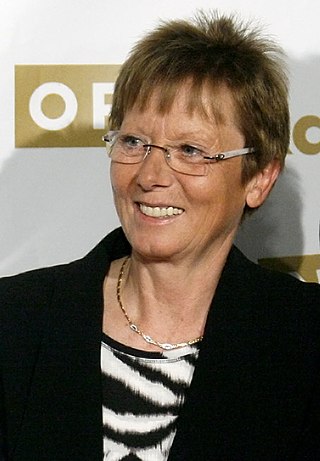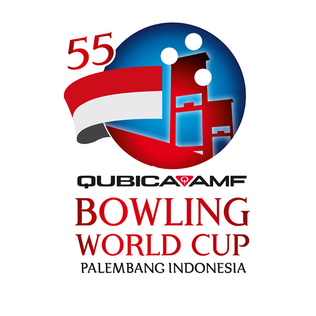Final point standings
In women's combined World Cup 1980/81 all 5 results count.
| 1981 Women's combined World Cup | |
| Previous: 1980 | Next: 1982 |
Women's combined World Cup 1980/1981
In women's combined World Cup 1980/81 all 5 results count.
All points were shown. bold indicate highest score - italics indicate race wins
| Place | Country | Total Points | 3 | 6 | 16 | 20 | 26 | Racers | Wins |
|---|---|---|---|---|---|---|---|---|---|
| 1 | 199 | 42 | 57 | 38 | 22 | 40 | 5 | 2 | |
| 2 | 143 | 7 | 27 | 33 | 46 | 30 | 6 | 0 | |
| 3 | 131 | 40 | 9 | 34 | 18 | 30 | 7 | 1 | |
| 4 | 85 | 23 | 32 | 10 | 20 | - | 2 | 0 | |
| 5 | 70 | 6 | - | 12 | 25 | 27 | 2 | 2 | |
| 6 | 21 | 3 | - | 8 | - | 10 | 1 | 0 | |
| 7 | 20 | 7 | 13 | - | - | - | 3 | 0 | |
| 8 | 18 | 10 | - | - | 7 | 1 | 5 | 0 | |
| 9 | 3 | - | - | 3 | - | - | 2 | 0 |
| Alpine skiing World Cup | |
| Women | |
Overall | Downhill | Giant slalom | Slalom | Combined | |
| 1981 |

The FIS Alpine Ski World Cup is the top international circuit of alpine skiing competitions, launched in 1966 by a group of ski racing friends and experts which included French journalist Serge Lang and the alpine ski team directors from France and the USA. It was soon backed by International Ski Federation president Marc Hodler during the FIS Alpine World Ski Championships 1966 at Portillo, Chile, and became an official FIS event in the spring of 1967 after the FIS Congress at Beirut, Lebanon.

Giant slalom (GS) is an alpine skiing and alpine snowboarding competitive discipline. It involves racing between sets of poles ("gates") spaced at a greater distance from each other than in slalom but less than in Super-G.

The FIS Nordic World Ski Championships is a biennial Nordic skiing event organized by the International Ski Federation (FIS). The World Championships was started in 1925 for men and opened for women's participation in 1954. World Championship events include Nordic skiing's three disciplines: cross-country skiing, ski jumping, and Nordic combined. From 1924 to 1939, the World Championships were held every year, including the Winter Olympics. After World War II, the World Championships were held every four years from 1950 to 1982. Since 1985, the World Championships have been held in odd-numbered years.
Alpine skiing at the 1968 Winter Olympics consisted of six events, held 9–17 February at Chamrousse, southeast of Grenoble, France. Jean-Claude Killy of France won all three men's events, repeating Toni Sailer's triple-gold of 1956. Since Killy's feat, no male alpine ski racer has won three gold medals in a single Olympics..

Annemarie Moser-Pröll is a former World Cup alpine ski racer from Austria. Born in Kleinarl, Salzburg, she was the most successful female alpine ski racer during the 1970s, with an all-time women's record of six overall titles, including five consecutively. She had most success in downhill, giant slalom and combined races. In 1980, her last year as a competitor, she secured her third Olympic medal at Lake Placid and won five World Cup races. Her younger sister Cornelia Pröll is also a former alpine Olympian.

The FIS Alpine World Ski Championships is an alpine skiing competition organized by the International Ski Federation (FIS).

Alpine skiing has been contested at every Winter Olympics since 1936, when a combined event was held in Garmisch-Partenkirchen, Germany.
Combined is an event in alpine ski racing. The event format has changed within the last 30 years. A traditional combined competition is a two-day event consisting of one run of downhill and two runs of slalom; each discipline takes place on a separate day. The winner is the skier with the fastest aggregate time. Until the 1990s, a complicated point system was used to determine placings in the combined event. Since then, a modified version, called either a "super combined" or an "Alpine combined", has been run as an aggregate time event consisting of two runs: first, a one-run speed event and then only one run of slalom, with both portions held on the same day.
The 15th World Cup season began in December 1980 in France and concluded in March 1981 in Switzerland. Phil Mahre became the first American to win an overall title, the first of his three consecutive overall titles. Marie-Theres Nadig of Switzerland won the women's overall title.
The 14th World Cup season began in December 1979 in France and concluded in March 1980 in Austria.
The 10th World Cup season began in December 1975 in France and concluded in March 1976 in Canada. Ingemar Stenmark of Sweden won the first of his three consecutive overall titles. Defending women's overall champion Annemarie Moser-Pröll, who had won five straight overall titles, missed the entire season so that she could care for her father, who was terminally ill with lung cancer. In her absence, Rosi Mittermaier of West Germany, a double gold medalist at the 1976 Winter Olympics, won the women's overall title.

The QubicaAMF Bowling World Cup, previously known as the International Masters and AMF Bowling World Cup, is an annual Ten-pin bowling championship sponsored by QubicaAMF Worldwide, and the largest in bowling in terms of number of participating nations. Each nation chooses one male and/or one female bowler to represent them in the tournament, and in the majority of cases, this is done by running a qualifying tournament, the winners of which are chosen.
Women's combined World Cup 1990/1991
Women's combined World Cup 2004/2005
Verawaty Fadjrin was an Indonesian badminton player who won international titles spanning from the late 1970s to the end of the 1980s. Tall and powerful, at one time or another she played each of the three variations of the sport at the highest world level.
Women's giant slalom World Cup 1980/1981

The Women's combined World Cup 1986 involved 4 events.
Nauti FC is a Tuvalu football club from Funafuti, playing in the Tuvalu A-Division.
The 11th World Cup season began in December 1976 in France and concluded in March 1977 in Spain. Ingemar Stenmark of Sweden won his second of three consecutive men's overall titles. Rosi Mittermaier, the defending women's overall champion, retired after the 1976 season, but Annemarie Moser-Pröll, who had won the previous five overall titles, returned from her 1976 sabbatical. However, Lise-Marie Morerod of Switzerland won the women's overall title.
The European qualifying competition for the 2023 FIFA Women's World Cup was a women's football competition that determined the eleven UEFA teams which directly qualified for the final tournament in Australia and New Zealand, and the one team which advanced to the inter-confederation play-offs.